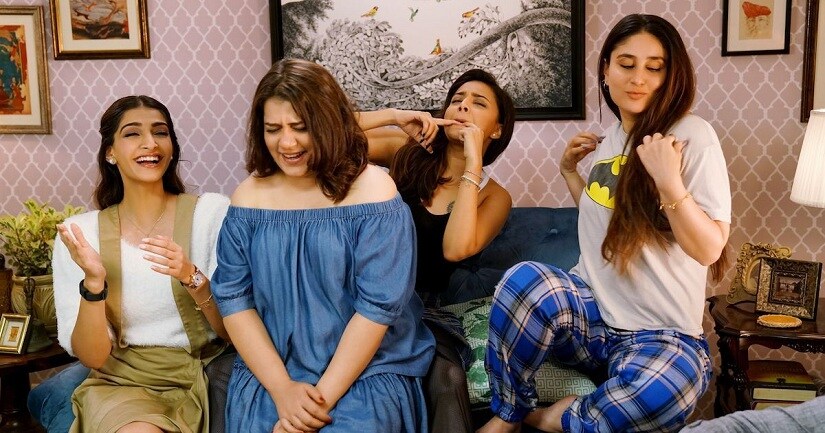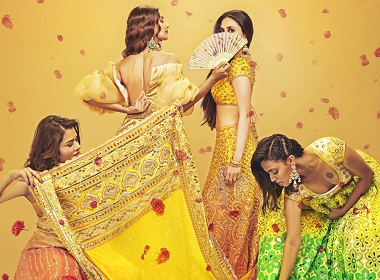As we move into the sixth month of 2018, one can sense that we have reached a tipping point in India, in terms of gender. The Kathua and Unnao rape cases have widened narratives surrounding gender and sexual violence against women, in terms of why such crimes are perpetuated and what are their outcomes. Ripples can be felt in the world of cinema, where women are speaking about the injustice meted out to them. Sri Reddy's nude protest , more conversations about the casting couch, the development of a Women's Collective in Cinema in the Malayalam film industry are all indicators of a shift towards a more equal future. In this clime, what the cast of Veere Di Wedding have reportedly said about the film’s gender politics and their stance on feminism has unsurprisingly gained attention. Their responses, and the assertion that their film must not be called a chick flick is worthy of a separate analysis itself, but it also brings to light the fact that increasingly, the onus of being political is being put on women. [caption id=“attachment_4489987” align=“alignnone” width=“825”]  The women of Veere Di Wedding. Image from Youtube.[/caption] Feminism as an ideology is still demonised and looked at with caution by many in the Hindi film industry. All the same, it has turned into a buzzword, much like nepotism did in 2017. It is now one of the dominant narratives in the Hindi film industry. The media concerns itself mainly with such buzzwords, not necessarily the politics of a film or of actors. Countless questions were raised about nepotism after the Kangana Ranaut-Karan Johar feud, but so few about the wage gap or sexual harassment, and virtually none about the non-representation of minorities.
Politics is given more of a flavour-of-the-season treatment by the media, rather than a constantly engagement.
The media directs these questions regarding feminism to women actors, but rarely seeks to interrogate men; the implication is that only women are stakeholders in achieving gender equality. Why else are we not asking men about if they have seen instances of the casting couch, been witness to discrimination, or for their views on being paid more than their female co-stars? (Although this selective questioning may not come as a surprise if we consider the kind of questions female actors are asked as opposed to male actors.) Also read: What Veere Di Wedding reveals about Indian films centered on women and how it can learn from Ocean's 8 This culture of going soft on movie stars stems from our larger celebrity culture — and men seem to benefit from it even more. They’re raised onto pedestals and feared. Few will ask Salman Khan about his ongoing court cases, or Amitabh Bachchan about his involvement in the Panama Papers, for fear of earning their ire. The approach has been so mild that most of them are not expected to answer such questions anymore. The result is that only a handful of ’tough’ questions are ever asked, and they are asked mainly to women. It can be argued that this has partly to do with Bollywood shying away from being political, both in its films and in the discourse surrounding its celebrities. The number of films that are outright political (Rajneeti, An Insignificant Man, Aarakshan) are too far and few, the number that feature non-Savarna characters in the lead (Mukkabaaz, Masaan) are the biggest minority.
It is encouraging to see that the imbalance between films led by men and those led by women is slowly evening out, with the release of a movie such as Raazi, which was critically and commercially acclaimed. Clearly, there is an audience for films where women with agency are in the spotlight.
Still, there is much left to be desired, which is why Veere Di Wedding (for its lack of politics, in the cast’s own words) is still an anomaly in the larger scheme of things. It is a film featuring four women in the lead roles, about their individual lives and choices, and it is produced by two women. The only noteworthy male actor cast in the film plays a secondary role. To call it radical would be taking it too far. Sonam and Rhea Kapoor possess more, in terms of cultural capital and a reputation in the industry, than any outsider. The film has also been criticised for its objectification of men in one particular song . It also seems to rely on tropes like smoking and swearing to make a point about choice and agency. And yet, this sort of film is unprecedented — despite the cast asserting that it is the story of that proves that “…girls are just like boys. We are also humans and do same things and have same problems.” When a gender whose voice has been largely missing from the film industry is at the center of a film, it goes against convention. At a time when the odds are stacked against women, any action that results in progress or a step forward, is radical and therefore political. Such a film plot will be considered “normal” only when a sense of gender equality is achieved.


)
)
)
)
)
)
)
)
)



